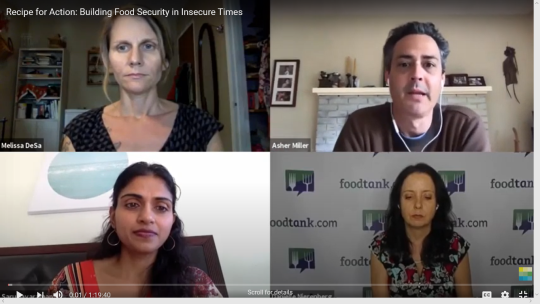Achieving Food Security Through the Challenges of COVID-19
As an AmeriCorps VISTA who works with non-profit organizations, one of which is the Redwood Empire Food Bank, and other community partners, I find it unacceptable and shocking how flawed our food system is and the way community members, including myself, have suffered from the impacts. I attended a webinar that looked at the effects of COVID-19 on food security. One of the most alarming parts of the discussion was learning that the incorporation of expecting workers to live on tips has been around since after slavery and it continues to have a detrimental effect to this day and to those from low-income backgrounds. Also, as a person of color, I am learning and unpacking so many inequalities that affect many sectors of my life, whether that be through food insecurity, environmental, or health issues. Although these are challenging times, this is the time where we are learning more about a system that is meant to provide the most basic necessity for the community and what we can be doing to change the way it has been working during and even after the pandemic.
The coronavirus pandemic has quickly changed our society and affected the “normalcy” of what our communities will look like moving forward. Specifically, this pandemic has exposed the problematic areas and cracks in our food production system, food consumption, and restaurant industries. Representatives from Food Tank, One Fair Wage, and Working Food Community Programs came together to discuss the failures of our food system, how service sector workers in restaurants have experienced a lack of financial and food security, and the ways organizations can pivot and work toward improvements in food security.
Co-founder and president of Food Tank, Danielle Nierenberg, detailed the concerns she has with the progress they have made on many issues, which now seems to be going backwards. Experts from the United Nations Food and Agriculture Organization predicted that hunger worldwide can increase to 265 million people and the food waste ratio can go from 30 to 40 percent. The closure of markets left people vulnerable to food insecurity, while agriculture and farm workers lost money because of the inability to sell their food. Also, with the closure of schools, children, those of whom heavily rely on food provided by the school, have been unable to receive food and lunches. However, Niernberg said this is an opportunity for organizations to pivot and create new ways to tackle this issue. For example, she mentioned there have already been strides in providing food security such as non-profit organizations delivering food to bus stops for families and the connection of coalitions and farm workers to combine knowledge and resources. We must understand that food equality and environmental issues are linked, so it’s important to address the root problems including poverty and inequality that have been major influences.
The president of One Fair Wage, Saru Jayaraman, explained how service sector workers, those who work in the restaurant industry, have been left with no food or financial safety nets due to the pandemic. Before the pandemic, the restaurant industry has been the largest among the food system and the fastest growing, but has the lowest paid employees. Due to a trade lobby called the National Restaurant Association, which has been around 150 years since the emancipation of slavery, their beliefs are extremely anti-health, anti-regulation, and anti-workers. The largest workforce in the United States only pays its employees 2 dollars in wages and expects them to live on tips. Since the pandemic, about 10 million workers have lost their jobs. However, they do not meet the minimum requirements for unemployment, so they have been denied. Low income people are being penalized for being low income. Jayaraman said this is a call for action, especially among employers, to pay employees full minimum wages with tips. Her organization serves as a tool for employees to be more organized, take a stand, and demand more security.
Melissa DeSa, the director of Working Food Community Programs, described the challenges and successes that have come from these uncertain and insecure times. In north central Florida, where DeSa’s organization is located, there have already been 1 in 3 children facing food insecurity, along with half of all households in the area. This organization focused on 3 programs: the seed program, the youth program and the culinary incubator program and woven in between these are community engagement, policy, and advocacy to try to help support these programs and to build a better infrastructure to have a better food community. DeSa explained that there is no easy way to pivot and get food to people in the fastest way possible. Nonetheless, there have been new ways and efforts in response to the community’s need for food and the educational piece that goes along with the programs the organization had. The seed program and other workshops have been shifted online, which has helped reach out to more people who may not have been able to go in person. Drive through food markets have been a success and local restaurants were mobilized to provide more meals for the community. The youth were given science and garden exploration kits that allowed them to continue what they have learned. Although it has been a difficult time for people, the community has really come together to make a lot happen.
Now is the time to revolutionize the food system and address the necessary changes that need to be made. While leading different organizations or movements, it is also imperative to act with kindness and inclusiveness and actually listen to the members of the community who are affected and continue to work collaboratively to shape the future.

Author: Alexandria Anderson



